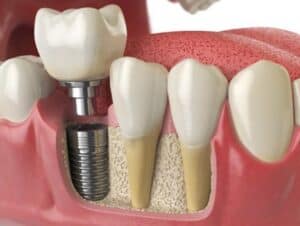
Interestingly, more than 120 million Americans find themselves in this boat, missing at least one tooth. After diving deep into research, we discovered that dental implants stand out as an exceptional solution.
Dental implants offer much more than just filling unsightly gaps; they’re akin to acquiring new teeth—robust and crafted to integrate flawlessly with your existing smile. Our guide meticulously navigates you through every phase of this journey, from your initial dentist appointment to recovery and everything in between.
If you’re ready for a transformative change, continue reading.
Key Takeaways
- Dental implants are strong posts, usually made of titanium, that can replace missing teeth and look and feel like real ones. They fit into your jawbone and fuse with it over time.
- Taking care of dental implants is easy, just like natural teeth. You need to brush twice a day, floss regularly, and go for dental check-ups to keep them in good shape.
- The process of getting dental implants involves several steps including consultation, planning, surgery for implant placement, possibly bone grafting if needed, waiting for bone growth around the implant, placing the abutment (connector), and then adding artificial teeth.
- Dental implants have a high success rate; about 90% to 95% work well without problems. This makes them a reliable choice for replacing missing teeth.
- The cost of dental implants varies depending on how many you need and other factors. While some insurance plans might help cover the costs, not all do. It’s important to look at all options to find an affordable solution.
Understanding Dental Implants

Dental implants are small, sturdy posts made usually of titanium. They act as the base for artificial teeth, like crowns or bridges, replacing missing teeth. The implant goes into the jawbone where a tooth used to be.
Over time, this post fuses with the bone around it. This process makes sure the artificial tooth stays in place just like a natural one would.
These tiny posts can replace one tooth or many teeth with something that feels and looks real. They’re also strong enough to handle eating and chewing without slipping. Getting these involves several steps and surgeries over months.
We prepare your mouth first, sometimes adding new bone if needed before placing the implant in stages. Each step requires healing time before moving on to the next part of making your new smile complete.
Now let’s look at why choosing dental implants could be great for you.
Advantages of Dental Implants

Dental implants give you a smile that feels and looks just like your own teeth. They stand the test of time, making eating and smiling easy again.
Natural look and comfortable fit
We know you want your smile to look and feel great. Dental implants give you just that. They match your natural teeth so well, no one can tell the difference. They also fit snugly in your gum, making them super comfortable.
You’ll forget they’re even there!
Getting these tooth roots means you won’t deal with gaps in your smile or wobbly artificial teeth. Your speech improves too because they stay put just like real teeth. You can laugh and talk without worry.
Plus, they don’t pinch or irritate your gum tissue like some dentures might.
Long-lasting and reliable
Dental implants provide a solid base for replacement teeth that are meant to last. Over time, they blend with your jawbone, creating a sturdy support for artificial teeth. This bond between the implant and bone means your new teeth will feel secure and work just like natural ones.
Dental implants stand the test of time because they are made from materials like titanium, known for durability.
Caring for dental implants involves habits similar to caring for your own teeth. Brushing twice daily, flossing, and regular dental check-ups help keep both your implants and natural teeth in top shape.
By sticking to these simple care routines, you ensure your dental work remains reliable year after year. Even more, this regular maintenance extends the life of your implants, making them a truly long-term solution for missing teeth.
High success rate
We have good news about getting dental implants. They often work out well. Many people choose them to replace missing teeth because most of the time, they stay put and do their job without any trouble.
In fact, studies show that these tooth roots made of metal have a very high chance of success over many years.
This means you can feel confident choosing them as a solution for missing teeth. Keeping up with visits to the dentist is key to make sure your new teeth stay healthy and strong for a long time.
We always work hard to ensure you get the best results from your treatment with us.
Improved ability to eat and chew
Dental implants give you back the joy of eating your favorite foods without worry. They feel and work like real teeth, making it easier to chew. This means no more avoiding hard or chewy foods.
Enjoy apples, steak, and corn on the cob again. With these tooth replacements, meal times become a pleasure.
Taking care of dental implants is simple too, much like natural teeth. Brushing twice a day and regular checkups keep them in top shape. Say goodbye to special cleaning tools or soaking solutions that dentures often need.
Welcome a hassle-free way to maintain oral health and enjoy all kinds of food with confidence.
Enhanced facial and bone features
We all want to look our best. Losing teeth can make your face look sunken and older. Dental implants offer a great solution. They provide stability, helping to keep the natural shape of your face.
This makes you look as young as you feel.
Implants also stop bone loss in the jawbone. Without tooth roots, the jawbone starts to shrink over time. Implants act like tooth roots, keeping the bone healthy and strong. This stops your face from looking aged because of missing teeth.
The Dental Implant Process

We’re here to guide you through the journey of getting dental implants. From your first visit to see if you’re a good candidate, all the way to choosing your new artificial teeth, we’ve got every step covered.
Consultation and Planning
First off, getting dental implants starts with a good plan. We meet to talk about your teeth and health. We ask about any health issues like diabetes because they can affect how well the implant works.
Our team uses this meeting to figure out if dental implants are right for you. We might suggest other tooth replacement options if needed.
Next step is planning. If we agree on dental implants, we make a detailed plan. This includes checking your mouth closely and maybe taking X-rays or 3D images of your jaw. Understanding the shape and health of your bone is key to placing the implant correctly.
Our goal is to ensure every step from here runs smoothly for you.
We start the dental implant surgery by removing damaged teeth. Then, we prepare your jawbone for surgery. This might include bone grafting if your jawbone isn’t thick enough. After your jaw heals, we place the metal posts in your jawbone.
These act as roots for your new teeth. Healing takes time as your bone grows around these posts.
Placing the implant is a careful process. We make sure each step sets you up for a strong and healthy smile. Bone growth can take several months, but it’s worth the wait. Once the bone has fused with the metal posts, we add an abutment to hold your new teeth.
Finally, custom-made artificial teeth are attached, giving you back a full smile.
Bone Grafting (if required)
Some people need bone grafting before getting dental implants. This happens if their jawbone isn’t thick or solid enough. We might use natural or man-made materials to build up the bone.
This makes a strong base for the implant.
Your dental care team will check if you need this step during your first visit. The UIC College of Dentistry is one place that offers this service at a good price. They help make sure your mouth is ready for the next steps in the process.
Waiting for Bone Growth
After placing the dental implant, we enter a waiting phase. This period allows the jawbone to bond securely with the metal post of the implant. It’s a process called osseointegration.
Think of it as letting concrete around a pole harden properly before putting any weight on it. The bone needs time to grow and wrap tightly around the implant, making sure it stays in place.
This growth period varies from person to person, usually lasting between three to six months. Factors like your overall health and where in your mouth the implant is placed affect how long this takes.
While you wait for your bone to strengthen, we might give you a temporary tooth crown so you can talk and eat without worry. Keeping regular check-ins with us during this time helps track the bonding progress until everything is ready for the final steps.
Placement of the Dental Implant
We make small holes in the bone where your missing tooth was. Then, we put in the metal post that will hold your new tooth. This part is very important for a strong foundation. The jawbone needs time to grow around this metal post.
This process is called osseointegration and it makes sure the base is solid for your new tooth.
During this time, taking care of your mouth is key. We advise you to clean well around the place we put the metal post. You need to brush, floss, and sometimes use special tools for cleaning if you have more than one implant.
Your gums need about two weeks to heal before we can add on top of the metal post and get you ready for your new artificial teeth.
Placement of the Abutment
Once the dental implant has securely fused with your jawbone, we move to the next step: placing the abutment. This part of the implant acts as a connector between your new tooth and the implant itself.
We carefully attach it above your gum line. Each abutment is customized to match your specific dental needs, ensuring a perfect fit for your replacement teeth.
This procedure doesn’t take long and is crucial for supporting your artificial teeth. With precision, our dentists secure the abutment to hold everything together firmly. It’s an essential step towards restoring your smile fully.
Choosing your new artificial teeth
We help you pick your new artificial teeth. This part is exciting. You get to choose the look and feel of your smile. Think about porcelain or ceramic for these teeth. They match well with natural teeth, giving a seamless look.
Your dentist will guide you on which material fits best for durability and looks.
Your new teeth can be a crown for just one tooth or bridges if multiple are missing. The prosthodontist makes sure they fit perfectly in your mouth, so eating and talking feel normal again.
Good care makes them last longer, just like real ones. Brushing, flossing, and regular checkups keep them great.
Dental Implant Recovery and Aftercare

After dental implant surgery, you might feel swelling, bruising, pain, and see a little bleeding. This is normal for the first 3 days. Taking it easy and following your dentist’s advice will help you heal faster.
Use ice packs to reduce swelling and take any medicines they give you.
Good oral hygiene keeps your implants healthy for years. Brush and floss every day just like with natural teeth. Don’t forget to visit the dentist regularly for checkups. They will make sure your implants are doing well and catch any issues early on.
Risks and Complications of Dental Implants
Dental implant surgery has its risks, just like any surgical procedure. Sometimes, the area around the new tooth root might get infected. Or, important parts near the implant area can suffer injury.
Our nerves are also at risk during this process. They could get harmed, leading to numbness or pain in your teeth, gums, lips, or chin. Sinus issues can happen if implants placed in the upper jaw protrude into one of your sinus cavities.
Bone grafting is another step some of us need before getting an implant. This is because our jawbone might not be thick enough or could be too soft to hold the implant in place securely.
Although many dental implants succeed and become a permanent part of our mouths, there’s a chance that the bone won’t attach tightly enough to the metal post. Other complications include damage to your sinuses, nerve discomfort affecting areas around your mouth, and rare instances where our bodies reject the implant due to allergic reactions.
Recovery from dental implant surgery generally takes about three days but expect some swelling and minor bleeding initially.
Dental Implant Success Rate and Longevity
We see a lot of success with dental implants. Most people who get them end up happy and problem-free for many years. Our records show that 90% to 95% of these titanium roots we place in the jawbone do their job well.
This is because they’re made from a material that your body accepts, letting it become a strong foundation for your new teeth.
Taking care of your dental implants makes a big difference too. Good habits at home and regular visits to us help keep those implanted supports lasting as long as possible. Next, let’s look at how much getting this fantastic treatment might affect your wallet.
Cost and Insurance Coverage of Dental Implants
After learning about the durability and success of dental implants, it’s time to talk money. The price for these tooth replacements can range widely. Factors like how many teeth you need replaced and the complexity of your case affect the cost.
For some, this might mean a few hundred dollars. Others might have to think about spending several thousand.
Insurance plays a big role in covering costs too. Not every insurance plan treats dental implants the same way. Some consider them under medical insurance, especially if they’re needed due to an accident or illness.
Other times, it’s up to dental insurance, which might have limits on what they’ll pay each year. Plus, there are cost-effective choices like All-On-Four implants that require fewer posts than traditional methods, saving you money.
Deciding if Dental Implants are Right for You
Talking about the cost and coverage brings us to an important decision: are dental implants right for you? Dental implants may be a great choice if you have missing teeth, need to replace a bridge, deal with slipping dentures, or have bite issues.
These titanium pieces directly fuse to your bone, providing strength and stability. This makes them a durable option for many.
We know making this choice involves considering several factors. Think about your overall health and oral hygiene habits since these play a big role in the success of dental implants.
With a 90%-95% success rate for those who take good care of their teeth and gums, it’s clear that maintaining excellent oral care is crucial. Also, the process takes multiple steps including placing the titanium piece and fitting the new prosthetic teeth.
It’s worth discussing with your periodontist or oral surgeon to see if this long-lasting solution fits your needs.
Conclusion
Dental implants give your smile a new start. They look real and feel right in your mouth. These tough helpers can last very long and work well, making eating easier than ever. Getting them involves several steps, from planning to picking out your new teeth.
After getting them, taking good care of your mouth makes sure they stay strong. If you’re thinking about dental implants, talk with a tooth doctor to see if they fit you best. Let’s make keeping a healthy smile simpler for everyone!
FAQs
1. What are dental implants?
Dental implants are small, strong pieces made of titanium or other materials that replace missing teeth. They get placed in your jawbone where they act like roots for new teeth.
2. How do I know if I’m a good candidate for dental implants?
If you have missing teeth, healthy gums, and enough bone to hold the implant, you might be a good candidate. Always talk to your dentist for advice.
3. What types of dental implants exist?
There are mainly two types: endosteal implants that go in the bone and subperiosteal implants that sit under the gum but on top of the bone.
4. Can dental implants fail?
Yes, but it’s rare. Implant failure can happen due to gum disease, not taking care of your implant properly or conditions affecting bone healing. Regular checkups help catch problems early.
5. What should I expect during a dental implant procedure?
The process involves one or more surgical procedures where an oral surgeon places the implant post into your jawbone; later attaching an abutment and then a crown or denture as replacement teeth.
6. Do I need special care for my dental implants?
Just like natural teeth, keep them clean with regular brushing and flossing! Also make sure to visit your dentist regularly for checkups and cleanings to ensure they last long.






